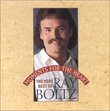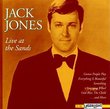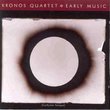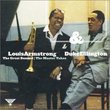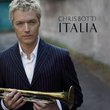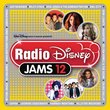| All Artists: Ludwig van Beethoven, Erich Wolfgang Korngold, Unspecified, Yannick Nézet-Séguin, Rotterdam Philharmonic Orchestra Title: Beethoven, Korngold: Violin Concertos Members Wishing: 0 Total Copies: 0 Label: Virgin Classics Original Release Date: 1/1/2009 Re-Release Date: 11/3/2009 Album Type: Enhanced Genres: Special Interest, Classical Styles: Forms & Genres, Concertos, Historical Periods, Classical (c.1770-1830) Number of Discs: 1 SwapaCD Credits: 1 UPC: 5099969458903 |
Search - Ludwig van Beethoven, Erich Wolfgang Korngold, Unspecified :: Beethoven, Korngold: Violin Concertos
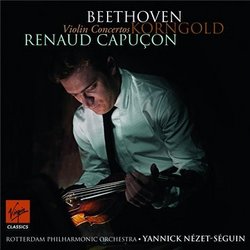 | Ludwig van Beethoven, Erich Wolfgang Korngold, Unspecified Beethoven, Korngold: Violin Concertos Genres: Special Interest, Classical
Capuçon's Virgin Classics discography is substantial, but much of the focus has been on chamber music -- only two previous discs have featured him in solo concertos. Now he takes on two highly constrasting works: Beet... more » |
Larger Image |
CD DetailsSynopsis
Album Description Capuçon's Virgin Classics discography is substantial, but much of the focus has been on chamber music -- only two previous discs have featured him in solo concertos. Now he takes on two highly constrasting works: Beethoven's sublime concerto, a touchstone of any major violinist's repertoire, and Korngold's gorgeous work, written in 1945 for one legendary violinist, Bronislaw Huberman, but premiered in 1947 by another, Jascha Heifetz. Korngold, once known primarily for his spectacular film scores, has in recent years achieved a significant presence in opera houses and concert halls -- notably with his early opera Die tote Stadt and with this concerto, which in fact draws on material that the composer originally produced for Hollywood movies, Another Dawn (1937), Juárez (1939), Anthony Adverse (1939) and The Prince and the Pauper (1937). Similarly Requested CDs
|
CD ReviewsCapucon, Nezet-Seguin, RotterdamPO: Beethoven, Korngold V Ct Dan Fee | Berkeley, CA USA | 12/02/2009 (5 out of 5 stars) "This disc is quite a personal surprise at the moment. I'm a rabid fan of young conductor Yannick Nezet-Seguin, no doubt. I wondered what he would do leading Rotterdam, and how he would do it. So this new disc offers part of an open-ended musical answer. I've also noted young violinist Renaud Capucon without quite becoming an avid fan. That, too, is possibly changing. The first work is our familiar Beethoven violin concerto. Except that this reading is really not the same old, same old. Not even a high, welcome level, same. Old. My personal benchmarks have long included Josef Suk with Sir Adrian Boult, Francescatti with Bruno Walter, Menuhin with Furtwangler, Erich Gruenberg with Horenstein, Heifetz with Munch, Itzhak Perlman with Giulini Then I was compelled to add in, Nikolaj Znaider (even with Zubin Mehta leading IsraelPO, whom I often can take or leave, unmoved). Now I am further provoked to add, Capucon and Nezet-Seguin and Rotterdam. The overall approach as I hear it, is: deeply indebted in a strikingly canny way to historically informed performance manners, yet still nonetheless being quintessentially modernist and nearly archetypical - clear and fresh and subtle in an ineffable, French musical manner. Listen to how Capucon inflects the open violin's rising solo steps in their turn, and you immediately realize he intends to cast new light on familiar Beethoven musical shapes. This is a risky business, and could easily fail in whole or in part; yet succeeds. Succeeds, wholly, musically. The performance manners at hand in Beethoven sounds infused with HIP practices, insofar as Capucon much prefers shortened phrasing and shaped energies in the moment. Nezet-Seguin and Rotterdam match this HIP deepening in tonal palette (woodwinds band contrasting piquantly with lean sounding strings and just the right touches of brass, though everybody plays contemporary instruments), energy, and phrasing. Any listener who already knows Jaap van Zweden's complete set of the Beethoven symphonies with Hague Residentie (SACD) - (or Hugh Wolff with Frankfurt) - will already have glimpsed what modern bands under younger conductors are doing now in many Beethoven readings, drawing on HIP manners. In the long first movement opening, Nezet-Seguin and Rotterdam put Beethoven the great musical thinker, spotlighted, front and center stage. The balance of martial shapes, strong harmony, and variation in development is deftly touched, and utterly clear. Like the Horenstein, this handling of the band reminds us that Beethoven was symphonic in his depth and scope of musical thinking. This violin concerto comes across, less as the elevated high endless song as in the hands of, say, Menuhin and Furtwangler; and more as a scintillating encounter marked by considerable intellectual and freethinking musical conversation. Beethoven the improviser of wit, force, intelligence is never far from us. Capucon plays the violin figurations so as to etch intervals, gather and transmit musical energies, and when he arrives (as he rather consistently does in this reading) at high string summit points, he breaks forth, finally into that stringed-winged song for whose heavenly fires brought down to earth and humankind we so often cherish other famous violinists in lasting readings of this Beethoven work. Capucon lights up a tonal aurora borealis of silvery hues, struck from his Guarneri del Gesu "Panette" fiddle. What a musical night sky. Beethoven left no written out cadenzas, and at the moment I am drawing a senior moment blank on the ones our soloist is using on this disc. The booklet doesn't say anything. Joachim? Auer? Capucon? Other? The cadenzas are not at all outlandish, thank goodness; so no redux of Gidon Kremer playing something inserted from Russian composer Schnittke, or even a Gidon Kremer violin version of the piano cadenza from the alternate Opus 61. The band is as fluent and persuasive in opening the slow middle movement, just as in the first movement, strings replacing the first movement woodwind section. Beethoven's tune is there, but again the force of harmony and interval is present, too, just waiting to be explicated. The violin solo is not so much beautiful, bejeweled royal treasure filigree - though Capucon's playing is beautiful, still - so much as counterpoint and commentary. Nezet-Seguin and Rotterdam ensure that symphonic assertion is never very far out of bounds, either. We may indeed be expecting to be fully charmed by this lovely Beethoven slow movement; yet listening, we may also be convinced. No sleepies. No lullabies. Sotto voce conversations of deep thought. The concluding Rondo is frisky, lively. Still a symphonic movement, still Beethoven the free thinker. Tempo is fairly mainstream, moving right along. Rhythms are etched with energy, and spring-stepped. The band has typical, requisite Beethoven chug and punch. Figurations and phrasings and band-soloist exchanges again sound more developmental and conversational, than decorative. What surprises me no end by the end of the concerto is that Capucon and his conductor-band have managed to think the whole thing through, so they carry a listener right through as well. The brisker phrasing somehow scrubs off a more customary, long legato violin manner - and I'm not disrespecting my fav Josef Suk or Menuhin or Heifetz or Perlman, here - as prelude to revealing new lights casting new shadows. I'm not so swayed that I wish to forgo my former benchmark readings altogether; but I can readily add Capucon and company to the keeper shelves. Following this muchness of this Beethoven concerto, I wondered what a Korngold concerto could possibly add to my mix. Well, okay, whew. Capucon and company have quite a sophisticated, cool take on Korngold's much vaunted Hollywood-inspiring Romanticism. I've listened to quite a few recordings, but only James Ehnes and Znaider ended up on my keeper shelves. Keep this Korngold, too. The chromatic meanderings of the opening jell into questing shapes. The famous repeats of the romantic oscillation do not swoon or wilt; as insistent as yearning. The outbursts of the band swell up like eddies moving our musical boats along. The first movement flow has a shape, a directness that is not yet too plain for its animated voice, and its constantly shifting colors. Suddenly all the quicksilver transformations seem purposeful, more inevitable than otherwise. I'm reminded of just how Nezet-Seguin read color and musical sense out of the hybrid Kaleidoscope by Pierre Mercure. Ditto, for how Capucon manages to go somewhere with the busy chromatic Korngold figures that come off as empty but modernist gestures pasted on, in other readings. And, when that luscious repeat tune and its backwards-forwards harmonies break out again, for once the moment does not sound pastiche or bathetic. An unexpected sense of personal drama emerges. No sentimentalizing, no hyped-up silent movie stock character poses. Okay, I'm running out of review space. I rank this Korngold as one of the best readings, so I'm keeping it with no hesitations. Even more unlikely, I can see I will be playing and replaying this Korngold. I find myself wondering what glory the violinist, conductor, and Rotterdam players would find, say, in the two Szymanowski violin concertos, given half a chance. If I were a producer, I'd put them in bold letters on my project calendar. If anybody can make the best musical sense of the two Szymanowski works, my bet lands on these numbers. Five, five, five stars. I really mean it, folks." Capucon isn't a great interpreter, but this CD has excellent Santa Fe Listener | Santa Fe, NM USA | 11/18/2009 (5 out of 5 stars) "The French axis in classical music has never been stronger, with stars like Aimard, Grimaud, Thibaudet, and the Capucon brothers bringing the kind of luster unknown since the prewar era of Cortot. If we extend the axis to Canada, the rising conductor Nezet-Seguin and pianist Marc-Andre Hamelin fill out the roster. As to particulars, when was the last time that a French violinist made a major bid to record the Beethoven concerto, much less the Korngold. Thanks to his connection with Martha Argerich, Renaud Capucon has risen to the top of the chamber music world as well. His general sound isn't as elegant and, dare I say, wiry as the typical French timbre, but in the Beethoven one hears immediately that Capucon isn't aiming at the fat Russian sound that dominates fiddling virtuosity today, nor is he as authoritative in his interpretation as what we hear from Tetzlaff and Zimmermann on the German side. His even tone production, controlled elegance, and finesse in phrasing remind me of Hilary Hahn, in fact -- this Bethoven concerto tends toward suppleness rather than power. Nezet-Seguin provides quite a forceful, traditional accompaniment of the sort I personally favor. The Rotterdam Phil. has been under the great Valery Gergiev for more than a decade, and they handle themselves with sweeping energy, helped by excellent recorded sound. In other words, the stage has been set for a special event, and yet Capucon can't quite convey the charisma of a great soloist. If you know Menuhin and Oistrakh in this music, his reading feels a bit dutiful. Yet the even, gorgeous tone of his instrument is undeniably captivating, and on musical grounds every phrase is solid. The Korngold is a frivolous disc mate, but it's better than the umpteenth pairing of the Beethoven concerto with the two romances. Since the French are crazy for all things Hollywood -- from the golden age, I mean -- I expected Capucon to swoon and sway. Instead, he prefers cocktail-party elegance and Gallic precision. Fair enough. His beautiful tone is perfectly matched to the score, and there's no hint of kitsch. Recently Tetzlaff released a sumptuous version with Gergiev and the Vienna Phil., which outclasses this one and joins Joshua Bell and Gil Shaham at the top of the list. If you want a violinist with impeccable taste, gorgeous tone, and the benefit of top-notch sound, this is quite an enjoyable CD." A truly exceptional release! Classics Lover | 11/19/2009 (5 out of 5 stars) "This recording is jaw-dropping. Both pieces from Beethoven and Korngold are extremely technically challenging. Not just for show, these pieces demand a high technical and virtuosic ability that Renaud delivers on. The second movement in Beethoven's Violin Concerto almost bought me to tears. There is just sheer emotional nobility to it. Capucon's reading of Korngold's concerto embraces its filmic lushness and craftly showcases its romantic lyricism. What I love about Capucon's performance on both concertos is that he performs not for show. He sets his ego aside and truly performs the concertos for what they are: technically demanding pieces that only a talented violinist like Capucon can perform."
|

 Track Listings (6) - Disc #1
Track Listings (6) - Disc #1